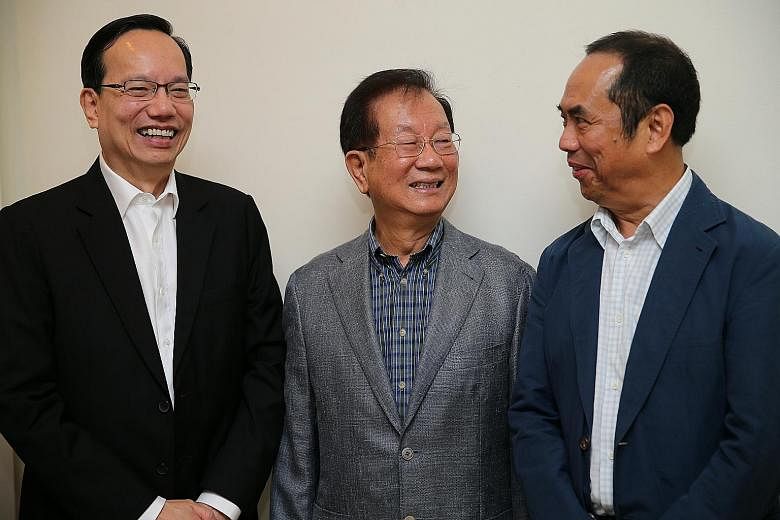When Mr Patrick Lee Kwok Kie joined Sing Lun in 1968, he was given the task of re-inventing his father's textile trading business.
At the time, the firm founded by his father Lee Chee Hung in 1951 was an importer, exporter and wholesaler of textiles.
The effort to transform the business proved to be much harder than it sounds.
Textile businesses in Singapore had began to wane amid growing competition from the region.
In a bid to diversify, Mr Lee started making bags for flour in line with a vision to move upstream towards apparel manufacturing .
But soon, the flour bags were replaced by plastic bags, he said.
So Mr Lee switched to making bedsheets, fashion apparel and sportswear.
"Besides the transformation of products, one also needs to be aware of economic changes," said Mr Lee.
Eventually, in the late 1990s, the firm was able to spread its wings abroad and now operates in Vietnam, Cambodia, Indonesia, Sri Lanka, China and Malaysia.
The 67-year-old chairman of Sing Lun Holdings was speaking at a recent sharing session by recipients of the SG50 Outstanding Chinese Business Pioneers Awards.
The awards were given out by the Singapore Chinese Chamber of Commerce and Industry in recognition of outstanding Chinese business pioneers who have made exemplary contributions to the Chinese community and the development of Singapore.
Also at the Mandarin-language sharing session held at the InterContinental Hotel were Hi-P International executive chairman Yao Hsiao Tung and Tee Yih Jia Food Manufacturing executive chairman Sam Goi Seng Hui.
The three pioneers urged local entrepreneurs to look beyond Singapore in expanding their businesses, as the local market is "too small", they said.
Tee Yih Jia produced only 8,000 pieces of spring roll pastry when Mr Goi acquired the firm in 1977.
By venturing overseas, the company today produces 38 million pieces of spring roll pastry (also known as popiah skin) a day, said Mr Goi.
The 66 year-old, known as the "popiah king", said: "The Singapore market is too small. It would not have been possible for us to produce 38 million pieces of popiah skin for local market. Nobody is going to eat that much popiah."
In 1980, Tee Yih Jia made its first foray into Australia, which served as a platform for expansion into other markets in Europe, North America and the Asia-Pacific.
Dr Yao, 75, echoed the same view.
He said: "Singapore is too small. A small fish may be very comfortable swimming in a pond by itself. But when the water in the pond dries up one day, the fish won't be able to survive. So, it is necessary to get out of the pond and into the ocean."
The former technical service manager of DuPont Singapore Electronics spoke about how he gave up his stable job to start Hi-P as a small tool maker in 1980.
Dr Yao overcame many setbacks. At one point he almost had the utilities to his office cut off because he did not pay the bills.
In 1993, Dr Yao saw the opportunity to venture into China as it was opening its doors to foreign investment. The move proved to be a big break for Hi-P. The firm has since grown into one of Singapore's largest electronics components makers, with a factory in Shanghai.
It is important to carry out due diligence when venturing overseas, said Mr Lee.
In 1982, his first step out of Singapore was to invest in Bangladesh.
"It was a failed venture as we were unfamiliar with the local business culture," said Mr Lee, who also felt that he did not have a strong team to oversee his overseas venture.
Undeterred, he started building a team to look for other opportunities overseas.
In 1997, due to demand for embroidery services by the then Walt Disney Trading Company, Sing Lun invested in an embroidery factory in Sri Lanka to service Walt Disney's embroidery needs in that country.
When the company was listed on the mainboard of the Singapore Exchange in 2000, its business in Sri Lanka was the major revenue contributor, said Mr Lee.
He added that it was by diversifying the company's business into garment manufacturing that he was able to break into more markets.
Automation has also helped to take the company's operations to a new level. By equipping its manufacturing facilities with the latest innovative garment manufacturing technologies, the company was able to attract new customers such as The North Face and Under Armour.
Mr Lee said: "Being in a traditional business, we are aware of the transformation of products internally and environmental changes (that could affect our business). And the need to have a good team to carry out your dreams.
"We have been in business for 64 years, but there are only two years that the company suffered losses. Not only did we survive several financial crises, we also came out stronger because we were willing to try new things and took calculated risks."

